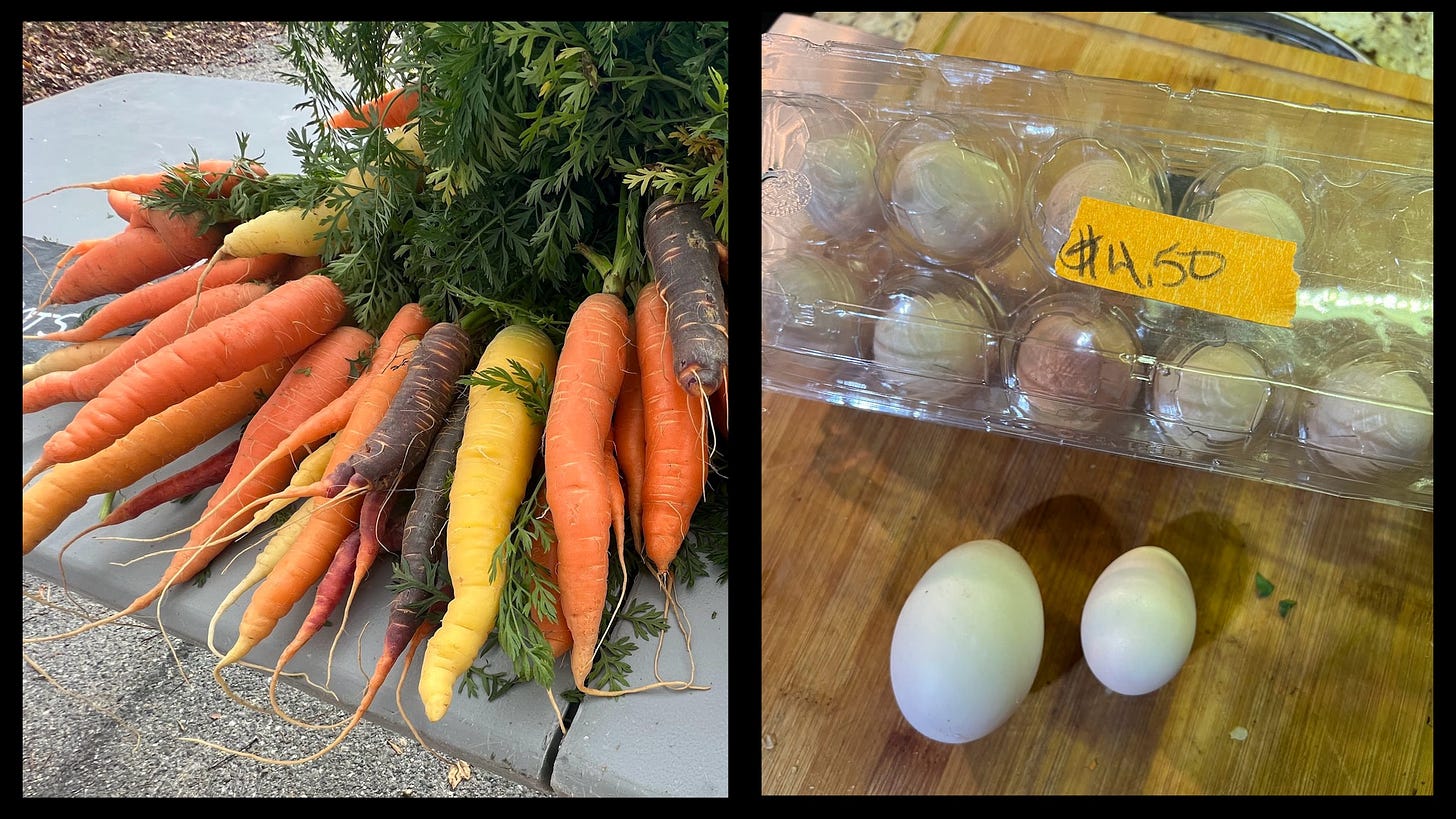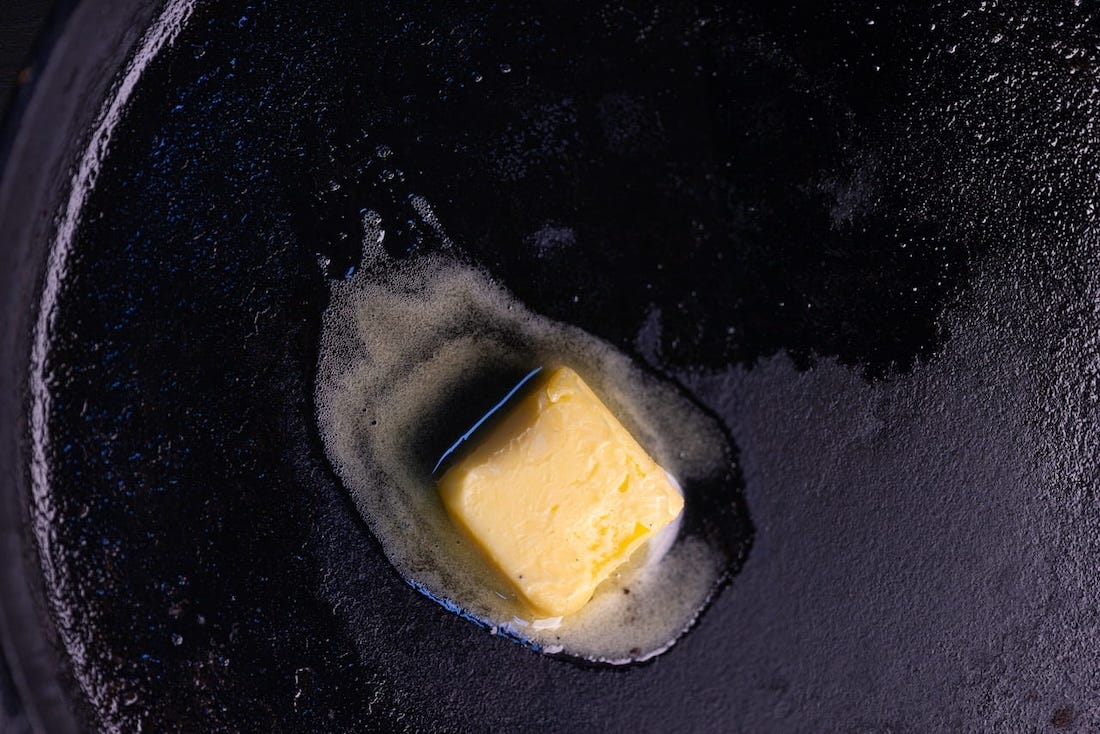Food Without Farms? Yes if You Also Want to Spare Land for Nature and Limit Warming
A fascinating new study shows that synthesizing key foods from scratch instead of in soil can cut global warming and land use. But what else could be lost?
I love food grown on farms, like these carrots from the final week of the Bar Harbor Farmer’s Market and these amusingly small and variegated eggs from the hens of some neighbors up the road here in Hancock County, Maine.
It’s clear to me that farms - both bespoke and industrial-scale - will supply the brunt of terrestrial food for humanity for decades to come. But what if a big portion of key dietary basics - dietary fats - could come from chemical processes that greatly reduce the need for farmland and also dramatically cut emissions contributing to global warming?
That’s the question that was just addressed in a new paper on a post-farming path to feeding the world without overheating it and stripping away more ecosystems.
The key finding:
Although scaling up such synthesis could disrupt agricultural economies and depend on consumer acceptance, the enormous potential reductions in greenhouse gas emissions as well as in land and water use represent a realistic possibility for mitigating the environmental footprint of agriculture over the coming decade.
These graphs from the paper show the potential reduction in emissions and land use in key countries.

I can’t break away to do a full-bore dive into this new work because I’m way behind trying to provide you with updates drawn from the Sustain What conversations I’ve hosted in recent weeks, including today’s show with three amazing people seeking peace pathways amid Middle East turmoil.
But I want to be sure you are aware of the research. So I’m posting an excerpt from the solid news release from the University of California, Irvine, to start the conversation.
I’m also reaching out to some longtime contacts in agriculture and related sciences. I’ll add some perspectives here soon.
Here’s the core of the news:
In a study published today in Nature Sustainability, the UCI-led team of scientists assess the potential for widescale synthetic production of dietary fats through chemical and biological processes. The raw materials for this method are the same as those used by plants: hydrogen in water and carbon dioxide in the air.
“Large-scale synthesis of edible molecules through chemical and biological means without agricultural feedstocks is a very real possibility,” said lead author Steven Davis, UCI professor of Earth system science. “Such ‘food without the farm’ could avoid enormous quantities of climate-warming emissions while also safeguarding biodiverse lands that might otherwise be cleared for farms.”
Davis and his co-authors highlight other environmental and societal benefits of farm-free food in the paper, including a reduction in water use and watershed pollution, local control over food production, diminished risk of weather-related food shortages, and less need for low-paying and physically demanding agricultural labor. Another plus, according to Davis, would be the possibility of returning existing farmlands to a natural state, which could enhance biodiversity and build up natural carbon sinks.
“I like the idea of not depending on photosynthesis for everything we eat,” Davis said. “At whatever scale, synthesizing food will alleviate competition between natural ecosystems and agriculture, thereby avoiding the many environmental costs of farming.”
Davis highlighted the practice of razing tropical rainforests to create space for palm oil plantations. Cookies, crackers, snack chips and a lot of other middle-of-the-store products are made with dietary fats coming from this source. He asked if anybody would notice if the oil used to bake their cookies came from a food refinery up the road instead of a plantation in Indonesia.
If you think that last point is unimportant, you haven’t kept up with reports on the forest impacts of the still-expanding palm-oil industry. My friends at Mongabay recent provided a sobering snapshot from Indonesia: Palm oil deforestation hits record high in Sumatra’s ‘orangutan capital’.








Nina White, a farmer in New Jersey, sent this reaction to my post on a new study charting the climate and land-sparing value of synthesizing dietary fats instead of relying on farmland:
On first glance, I will argue that farms can be run in harmony with biodiverse ecological systems. Like ours. There is no need to continue to clear land for agriculture. The whole palm oil industry can certainly disappear as far as I am concerned. Besides destroying important natural resources, the snack industry is responsible for the obesity issue worldwide.
In order to create this change, the world of eaters needs a good deal of re-education. The concept of "at scale" needs to change, as does the phrase "cost effective". When the costs to nutrition, communities, and culture are worked into the equation, the synthesized foods will only contribute to the degradation of the human race overall. Which is too high a price.
You love your Farmers Market veggies as much as I do, because they are deeply nourishing, having grown in living soil, with a diverse microbiome that could never be recreated in a vat of primordial soup! It's my hope that we can relocalize food around the globe, sensitive to the delicate ecosystems of each region, and the traditional ways of the people that live there. It's a reach, but we have to reach!
If you are aware of folks who agree with my line of thinking, please put me in touch.
Take care, and thanks for your dedication to our world,
Nina White
Bobolink Dairy & Bakehouse, Bobolink LLC
https://www.cowsoutside.com/
Forest impacts ongoing, forests disappearing on our watch. Seems like a no-brainer to me to produce fats used for baking in labs. There will always be complainers. Let them source the originals from sustainable farming at exorbitant prices.
Hope a serious philanthropist will put their hand up to fund the development of this invention. Though maybe the time for 'hoping' for people to step forward for things like this is past, and we need to invent ways to convince them it's the right and good thing to do.